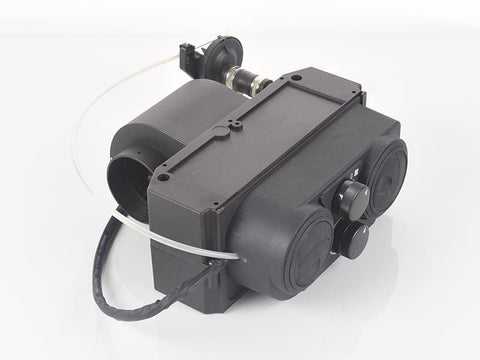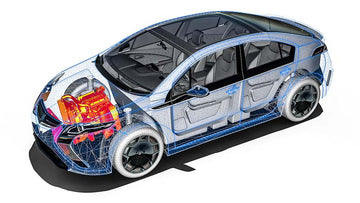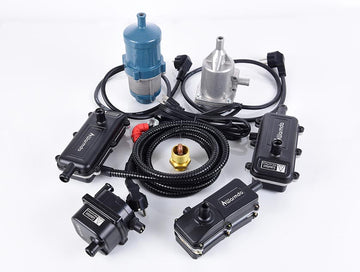Enhancing Your Winter Driving Experience: A Comprehensive Guide to Car Heaters
Apr 09, 2024
Introduction
The arrival of winter brings its own set of challenges, especially for drivers facing the daunting task of starting their cars in freezing temperatures. Cold mornings can transform into a battle against the elements, where a car's inability to start not only disrupts your day but could also affect the vehicle's performance and longevity. This is where the significance of car heaters becomes undeniable.

The Impact of Cold Weather on Vehicles
Firstly, let's delve into the challenges vehicles face during winter, particularly under extreme cold conditions. Low temperatures can significantly reduce the flowability of engine oil, making engine startups more difficult. Furthermore, cold weather slows down the evaporation rate of fuel, adding to the startup challenge. The differential expansion rates of various metal materials due to temperature changes also test the engine's air tightness, complicating engine startups in cold conditions. Additionally, persistent low temperatures can drastically affect the comfort of passengers, thereby impacting the driving experience.
The Importance of Car Heaters
In these challenging winter conditions, car heaters emerge as a beacon of hope. Whether it's engine block heaters, diesel engine heaters, diesel air heaters, cabin heaters, or fuel heaters, their primary goal remains the same: to ensure your vehicle starts smoothly in cold weather and to provide a warm and comfortable driving environment for you and your passengers.
Challenges of Winter Driving
Winter not only showcases its beauty but also brings a series of challenges for vehicles and drivers. Let's explore these challenges and how to effectively address them.

Cold's Impact on Engines
The difficulty in starting your car on a cold winter morning is not just a feeling. In fact, low temperatures directly impact engine performance by significantly reducing the flowability of engine oil. This increased friction not only makes the startup process more difficult but can also lead to increased engine wear. Additionally, the differential thermal expansion of metal materials can reduce engine block air tightness, further affecting startup capabilities. Cold environments also impact fuel evaporation efficiency, disrupting the ideal fuel-air mix and affecting engine efficiency and performance.
Comfort and Safety Concerns for Drivers and Passengers
Beyond affecting engine performance, cold weather directly impacts the comfort and safety of you and your passengers. Entering a cold vehicle and waiting for it to warm up can affect your mood and health over time. Driving in cold conditions can reduce reaction times, increasing safety hazards. Moreover, cold weather can cause windows to frost or fog up, severely impacting visibility and increasing driving risks. Thus, maintaining a warm interior is crucial not just for comfort but for safety as well.
Addressing the Cold
Fortunately, with the right equipment and knowledge, these issues can be effectively addressed. Car heaters, whether for directly heating the engine or improving cabin temperature, offer necessary protection and comfort during cold weather.
Overview of Car Heaters
As winter approaches, concerns about difficult startups or a cold interior become more pressing. Car heaters are not just a comfort feature; they are essential for enhancing your winter driving experience.
Why Your Car Needs a Heater
In cold conditions, traditional engine startup and heating systems may struggle, directly affecting your driving experience, vehicle performance, and safety. Car heaters become crucial at this point, not only making your vehicle easier to start but also quickly warming the interior to a comfortable temperature, reducing engine wear, and improving fuel efficiency.
- Reducing Engine Wear: Startups cause significant engine wear, especially in winter. Engine block heaters can preheat the engine, maintaining oil flowability and reducing wear during cold startups.
- Improving Fuel Efficiency: Cold weather lowers fuel evaporation rates, making engines harder to start and reducing fuel efficiency. Preheating the engine helps improve fuel efficiency and reduce unnecessary fuel consumption.
- Enhancing Driving Safety and Comfort: By reducing window frosting and providing a warm cabin environment quickly, heaters directly enhance driving safety and comfort.
- Environmentally Friendly: Reducing ineffective engine running not only saves fuel but also reduces emissions, minimizing environmental impact.

Car heaters are key for drivers in cold regions to improve their winter driving experience. Let's explore different types of car heaters to understand their workings and how to choose the right one for your vehicle and needs. Whether your goal is to improve engine performance or simply to increase comfort during driving, understanding these heaters will greatly assist you.
Engine Block Heaters
Starting your car smoothly on a cold winter day can be challenging. Thankfully, engine block heaters offer an effective solution to make this process easier.
Principle and Advantages
Working Principle: Engine block heaters operate in a direct and efficient manner by using electrical heating elements to preheat the engine coolant. Thanks to built-in water pumps, this heated coolant is quickly circulated throughout the engine, raising its temperature. Built-in temperature controllers ensure the heater operates safely without overheating. This process not only increases the engine's internal temperature but also maintains the flowability of engine oil, effectively reducing friction and wear during cold starts.
Advantages Include:
- Improved Startup Performance: By preheating the engine, block heaters significantly reduce the difficulty of cold starts, allowing the engine to start more easily and quickly, even in extreme cold.
- Extended Engine Life: Reducing friction during cold starts means less wear on the engine, thus extending its life.
- Increased Fuel Efficiency: An engine operating at the right temperature can burn fuel more efficiently, reducing fuel waste.
Effectiveness Showcase:
Imagine preparing to leave on a cold winter morning. Without a heater, you might have to attempt starting your vehicle multiple times, with noticeable engine shuddering and noise during the process. However, with an engine block heater, the scenario changes significantly. For example, at -20°C, an unheated engine may require multiple starts and could suffer from severe wear harmful to its health. In contrast, a vehicle with a block heater can start smoothly on the first try, running smoothly without the additional wear of a cold start.
Using an engine block heater not only provides a worry-free cold start experience but also offers your vehicle longer life and higher fuel economy. This investment offers tremendous value for you and your car during the cold winter months.
Diesel Engine Heaters
For those driving diesel vehicles, cold starts in winter can be particularly troublesome. Fortunately, diesel engine heaters are designed specifically to address this challenge, especially in situations where using an electrical source is impractical.

Special Design Reasons
The challenge of starting diesel engines in low temperatures is primarily due to diesel fuel's physical properties. In cold environments, diesel becomes more viscous, directly affecting fuel supply and injection efficiency. Moreover, diesel's higher auto-ignition point means achieving effective ignition and combustion is more difficult at low temperatures. To overcome these issues, diesel engine heaters are designed to use diesel fuel instead of electricity to heat the coolant, offering a solution suitable for environments where electrical access is inconvenient.
Working Principle
Diesel engine heaters heat the coolant by burning diesel fuel, then this heated coolant circulates through the engine, raising its temperature. This method allows the engine to be preheated by burning its own fuel, overcoming the difficulties of starting in cold environments without the need for external power.
Advantages and Effects
- Convenience: For those without easy access to power, diesel engine heaters offer an extremely convenient solution. Wherever you are, as long as there's diesel in your vehicle, you can preheat it.
- Improved Startup Reliability: Preheating the engine ensures it can start quickly and reliably, even in extreme low temperatures.
- Reduced Wear and Extended Life: By reducing wear during cold starts, diesel engine heaters help extend the engine's lifespan.
- Increased Fuel Efficiency: A preheated engine can burn fuel more effectively, improving fuel economy and reducing unnecessary waste.
- Environmental Friendliness: More complete fuel combustion reduces emissions, making it environmentally friendly.
Diesel engine heaters provide an efficient, convenient solution for diesel vehicle owners without easy access to power, ensuring startup reliability and engine performance in cold weather. Investing in a diesel engine heater will enhance your smooth and comfortable driving experience during the cold winter months.
Diesel Air Heaters
Winter not only challenges vehicle startups but also maintaining warmth inside the car. In this context, diesel air heaters emerge as an ideal choice for improving combustion efficiency and interior comfort. Let's delve into their working principles and how they make your driving experience more enjoyable.
Working Principle

Diesel air heaters operate on a unique principle, generating heat by burning diesel fuel and then transferring this heat to the air passing through the device. This process does not rely on the vehicle's engine status, thus it can effectively work even when the engine is off, providing warmth.
These heaters consist of several components: a combustion chamber, a fan, a control unit, and a fuel pump. The fuel pump delivers diesel to the combustion chamber, where it is ignited and generates heat. The fan then disperses this heat into the cabin, thus increasing the interior temperature independently of engine operation.
Adding Comfort to Your Drive
One of the main advantages of diesel air heaters is their ability to rapidly increase cabin temperature, offering immediate warmth to you and your passengers. The comfort of entering a preheated vehicle on a cold winter day is invaluable. Moreover, since it operates independently of the engine, it can provide heat without increasing engine wear.
Additionally, diesel air heaters help maintain clear windows by reducing the fogging caused by temperature differences, thereby enhancing driving safety. They can also continue to provide warmth during parking, making long stays in cold weather more comfortable.
For those who work or live in their vehicles for extended periods, diesel air heaters offer an ideal heating solution. They not only provide continuous warmth inside the vehicle but also ensure a more comfortable and safer environment, whether for rest or as a temporary living space.
In summary, diesel air heaters not only improve combustion efficiency and reduce fuel consumption but also significantly enhance interior comfort and safety. Whether starting your vehicle on a cold morning or maintaining warmth during long drives, diesel air heaters are an excellent option to consider.
Cabin Heaters
Cabin heaters are crucial for improving comfort and passenger experience during cold weather driving. Understanding the different types of cabin heaters and their workings can help you choose the most suitable heating solution for your needs. Cabin heaters are primarily of three types, each with its unique advantages and applications.
Coolant-Based Heaters
The first type of cabin heater uses the heat generated by the vehicle's engine coolant. As the coolant passes through the cabin heater, it heats the air, thereby warming the cabin interior. The advantage of this type of heater is its ability to utilize the heat already produced by the engine, requiring no additional energy consumption, but it needs the engine to be running.

Electric Heaters
The second type of cabin heater uses electricity to heat heating elements, which then warm the air inside the cabin. This type of heater provides rapid heating, especially suitable for scenarios where quick temperature increases are needed. Like coolant-based heaters, electric heaters also require the engine to be operational.

Combustion Heaters
The third type, combustion heaters, generate heat by burning diesel or gasoline. Their biggest advantage is their ability to operate independently of the vehicle's engine, thus providing continuous heat even when the engine is off. Combustion heaters are particularly useful for maintaining a warm cabin during parking situations, such as overnight rests or waiting periods.

Ensuring Passenger Comfort
Regardless of the type chosen, cabin heaters play a vital role in maintaining interior temperature and ensuring passenger comfort. Especially in cold weather, the right cabin heater can enhance the overall driving experience, keeping you and your passengers warm and comfortable throughout the journey.
Technical Details and Effects
Each type of cabin heater has its technical strengths and suitable applications. When choosing the most appropriate heater, consider your specific needs—whether engine startup is necessary, speed of heating, etc. The right heater can not only increase comfort but also improve driving safety, for instance, by maintaining clear visibility by preventing internal window frosting and fogging.
In conclusion, cabin heaters provide efficient heating solutions, offering warmth and safety on your journeys during the cold winter months. Whether starting your vehicle on a frosty morning or keeping warm during long drives, selecting the right cabin heater is key to enhancing your driving experience.
Fuel Heaters
As the cold winter months approach, diesel vehicle drivers face unique challenges, one of which is ensuring fuel flowability at low temperatures. Fuel heaters play a pivotal role in this aspect, heating diesel to optimize its flowability and combustion process, thereby improving overall fuel efficiency. Let's explore how fuel heaters become economic and efficiency enhancers during winter driving.

Improving Fuel Efficiency
In cold weather, diesel's flowability significantly decreases, increasing the workload on fuel pumps and deteriorating fuel atomization quality, which affects engine startup and combustion efficiency. Fuel heaters warm the diesel to an optimal temperature for injection and combustion before it enters the engine, facilitating a more complete and efficient combustion process.
This improvement in fuel flowability and combustion efficiency directly impacts vehicle fuel economy, meaning the vehicle can achieve better performance with lower fuel consumption, which is particularly important for long journeys and daily driving in cold seasons.
An Economical Choice for Winter Driving
Utilizing fuel heaters not only optimizes vehicle performance but also represents a wise economic choice. By ensuring good fuel flowability and combustion efficiency at any external temperature, fuel heaters help reduce overall fuel consumption during winter driving. For drivers seeking economy and efficiency, fuel heaters represent a worthwhile technological investment.
Moreover, optimized fuel quality enhances vehicle performance and responsiveness. Quick starts and maintaining good acceleration performance in cold weather are essential for safe driving. Fuel heaters, by ensuring fuel quality, provide stable and reliable power output.

In summary, fuel heaters improve diesel flowability and combustion quality, enhancing fuel efficiency and vehicle performance, and offering significant support for economical winter driving. Whether reducing energy consumption, saving costs, or improving driving experience and safety, fuel heaters are an indispensable part of winter driving preparations.
Choosing the Right Car Heater
Facing the cold winter months, selecting a suitable heater for your beloved vehicle is crucial. The right heater not only improves your driving experience but also enhances vehicle performance and extends its lifespan. Here are guidelines to help you choose the right heater based on your vehicle type and power availability.
Based on Vehicle Type and Power Availability
- Electric Engine Block Heaters: If you park near a power source, whether you drive a gasoline or diesel vehicle, electric engine block heaters are an ideal choice. They heat the coolant through electricity, preheating the engine to ensure smooth starts in cold weather.
- Diesel Vehicle Heaters: For diesel vehicle owners, considering diesel engine heaters, diesel air heaters, and fuel heaters is wise. These heaters are specifically designed for diesel vehicles to improve fuel flowability and combustion efficiency, maintaining good engine performance and cabin temperature in cold weather.
- Gasoline Vehicle Heaters: Gasoline vehicle owners can opt for gasoline engine heaters and air heaters. These heaters are tailored to gasoline's characteristics, providing effective engine preheating and cabin heating solutions in cold environments.
- Electric Vehicle Heating Systems: Electric vehicle owners should consider electric heating systems. These systems directly use the vehicle's battery to provide cabin heating, efficiently maintaining a comfortable driving environment while minimizing energy consumption.
Analyzing Your Needs
- Startup Heating: If cold starts are your main concern, engine block heaters or combustion engine heaters might be the best options, helping you start your vehicle effortlessly on cold mornings.
- Cabin Temperature: If improving cabin warmth and comfort is your priority, diesel air heaters or electric cabin heaters are better choices, providing continuous heat independently of engine operation.
- Economy and Environmental Impact: Considering the economic and environmental impact is important. Choosing a high-efficiency, low-emission heater is crucial. While combustion heaters offer efficient heating, they may increase fuel consumption; electric heaters might be more eco-friendly when charged from renewable energy sources.
Budget and Installation
Budget is also an important consideration when selecting a heater. Generally, combustion heaters and electric heaters may have higher initial installation costs but could be more economical in the long run due to lower operational costs. Considering the convenience of installation and potential maintenance costs is also vital.
Expert Consultation
Consulting experienced professionals or service providers is always a good idea before making a final decision. They can offer professional advice on different heaters' performance and suitability, helping you choose the most appropriate heater based on your specific vehicle type and needs.
By carefully considering the above factors, you'll be able to choose a suitable heater for your vehicle, ensuring optimal performance and comfort during the cold winter months.
Conclusion: Final Thoughts on Enhancing Your Winter Driving Experience
As we've explored various types of car heaters and their significant impact on winter driving experiences, it's time to make a decision and equip your vehicle with the right heater. Whether you're facing difficult cold morning startups or seeking to maintain a warm and comfortable cabin during cold winter days, choosing the right heater is key to enhancing your winter driving experience.

From electric engine block heaters to diesel and gasoline air heaters, each heater type has its unique advantages and suitable scenarios. Considering your vehicle type, personal needs, and power accessibility will guide you to the most appropriate choice. Whether your choice is driven by the desire to improve fuel efficiency, reduce engine wear, or simply increase driving comfort, ensuring you select an efficient heater that meets your needs is crucial.
Remember, investing in the right car heater is not only an investment in your personal comfort but also in vehicle performance and safety. Being able to start your car effortlessly in cold weather and enjoy a warm interior throughout your journey greatly enhances your driving experience.
We encourage every reader to take action, choosing the appropriate car heater for your vehicle based on your model and personal needs. Don't let cold weather hinder your travel plans or daily commutes; select the right car heater and enjoy every safe and comfortable winter drive.






